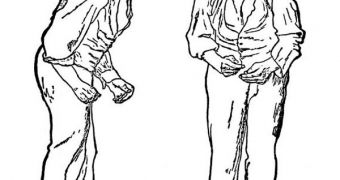A group of Danish investigators from the University of Copenhagen announce that analysis of sleep cycle patterns could easily reveal the earliest symptoms of Parkinson’s disease, in people who are at risk of developing this form of dementia.
The group studied a series of conditions known as REM (rapid-eye movement) sleep behavior disorder (RBD). The condition itself may be a symptom of the neural disorder, the researchers learned.
According to scientists, our body is very efficient at sleeping, in the sense that, when we go into REM sleep, our brains disconnect our muscles from motor control. This prevents us from running in bed while sleeping.
But this cessation is non-existent in people suffering from RBD. They exhibit symptoms such as jumping out of the bed, shouting, spasm, kicking and others of this nature, PsychCentral reports.
“In some cases their behavior may be violent and result in injuries to the patients or their partners,” explains University of Copenhagen professor of clinical neurophysiology Poul Jennum, MD.
“In the study, we saw that eight years before diagnosis, Parkinson’s sufferers exhibited work and health indications that something was wrong,” adds the expert. He and his team published details of their work in the latest issue of the esteemed Journal of Neurology.
“Our hypothesis is that the very earliest stages of Parkinson’s disease show up as various other diseases such as RBD,” the investigator argues. He says that treating the disease is very difficult still, in spite of recent advancements made in new therapies.
One way of reducing the healthcare costs associated with Parkinson’s disease is to detect and start treating the condition earlier on. However, diagnostics tools to do so are lacking today, which means that doctors need to stick to treating patients when the disease is already fully set in.
“The question is of course whether we can actually say that RBD is always a very early marker for Parkinson’s disease. That is what we are now investigating at the Sleep Center at Glostrup Hospital,” Jennum goes on to say.
The new investigation was conducted on all patients that were diagnosed with Parkinson's disease in the country between 1997 and 2007. Researchers used the National Patient Register to get the data.
Some 13,700 patients were discovered and analyzed, the team says. Their data were compared to those collected from over 53,600 healthy subjects. All test participants were consistent in influencing factors such as gender, social class, and educational background.

 14 DAY TRIAL //
14 DAY TRIAL //